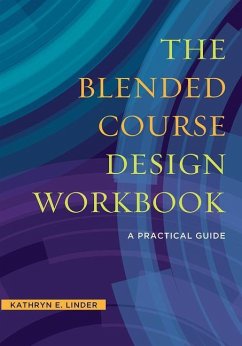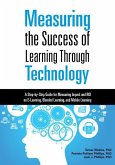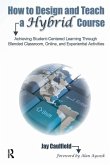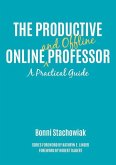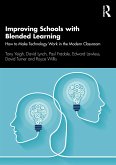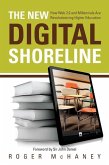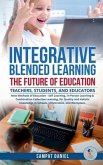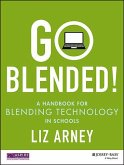- Broschiertes Buch
- Merkliste
- Auf die Merkliste
- Bewerten Bewerten
- Teilen
- Produkt teilen
- Produkterinnerung
- Produkterinnerung
Blended (also called hybrid) classrooms, in which face-to-face interaction is intentionally combined with online activities to aid student learning, are becoming more and more common.
Andere Kunden interessierten sich auch für
![Measuring the Success of Learning Through Technology: A Step-By-Step Guide for Measuring Impact and Roi on E-Learning, Blended Learning, and Mobile Le Measuring the Success of Learning Through Technology: A Step-By-Step Guide for Measuring Impact and Roi on E-Learning, Blended Learning, and Mobile Le]() Tamar ElkelesMeasuring the Success of Learning Through Technology: A Step-By-Step Guide for Measuring Impact and Roi on E-Learning, Blended Learning, and Mobile Le44,99 €
Tamar ElkelesMeasuring the Success of Learning Through Technology: A Step-By-Step Guide for Measuring Impact and Roi on E-Learning, Blended Learning, and Mobile Le44,99 €![How to Design and Teach a Hybrid Course How to Design and Teach a Hybrid Course]() Jay CaulfieldHow to Design and Teach a Hybrid Course49,99 €
Jay CaulfieldHow to Design and Teach a Hybrid Course49,99 €![The Productive Online and Offline Professor The Productive Online and Offline Professor]() Bonni StachowiakThe Productive Online and Offline Professor37,99 €
Bonni StachowiakThe Productive Online and Offline Professor37,99 €![Improving Schools with Blended Learning Improving Schools with Blended Learning]() Tony YeighImproving Schools with Blended Learning59,99 €
Tony YeighImproving Schools with Blended Learning59,99 €![The New Digital Shoreline The New Digital Shoreline]() Roger McHaneyThe New Digital Shoreline52,99 €
Roger McHaneyThe New Digital Shoreline52,99 €![INTEGRATIVE BLENDED LEARNING - The Future of Education. INTEGRATIVE BLENDED LEARNING - The Future of Education.]() Sampat DanielINTEGRATIVE BLENDED LEARNING - The Future of Education.15,99 €
Sampat DanielINTEGRATIVE BLENDED LEARNING - The Future of Education.15,99 €![Go Blended! Go Blended!]() Liz ArneyGo Blended!24,99 €
Liz ArneyGo Blended!24,99 €-
-
-
Blended (also called hybrid) classrooms, in which face-to-face interaction is intentionally combined with online activities to aid student learning, are becoming more and more common.
Hinweis: Dieser Artikel kann nur an eine deutsche Lieferadresse ausgeliefert werden.
Hinweis: Dieser Artikel kann nur an eine deutsche Lieferadresse ausgeliefert werden.
Produktdetails
- Produktdetails
- Verlag: Taylor & Francis
- Seitenzahl: 224
- Erscheinungstermin: 1. November 2016
- Englisch
- Abmessung: 254mm x 177mm x 20mm
- Gewicht: 438g
- ISBN-13: 9781620364369
- ISBN-10: 1620364360
- Artikelnr.: 45006463
- Herstellerkennzeichnung
- Produktsicherheitsverantwortliche/r
- Europaallee 1
- 36244 Bad Hersfeld
- gpsr@libri.de
- Verlag: Taylor & Francis
- Seitenzahl: 224
- Erscheinungstermin: 1. November 2016
- Englisch
- Abmessung: 254mm x 177mm x 20mm
- Gewicht: 438g
- ISBN-13: 9781620364369
- ISBN-10: 1620364360
- Artikelnr.: 45006463
- Herstellerkennzeichnung
- Produktsicherheitsverantwortliche/r
- Europaallee 1
- 36244 Bad Hersfeld
- gpsr@libri.de
Dr. Katie Linder is currently the executive director for program development at Kansas State University Global Campus. Previously, she directed the award-winning Ecampus Research Unit at Oregon State University. Katie is also a Certified Coach through the International Coach Federation. Katie is an avid writer and researcher with a passion for process and peeking behind the scenes at what it takes to be a successful academic. For the past several years, her work has focused on blended course design best practices, institutional supports for accessible online learning, and research literacy for scholarship of teaching and learning practitioners and distance education stakeholders. She speaks on topics related to writing and publication; creativity and productivity; self-promotion and personal branding; and teaching and learning with technology.Her latest works include Going Alt-Ac: A Guide to Alternative Academic Careers (Stylus, 2020; co-authored with Kevin Kelly and Tom Tobin), Managing Your Professional Identity Online: A Guide for Faculty, Staff, and Administrators (Stylus, 2018), High-Impact Practices in Online Education (Stylus, 2018), and The Business of Innovating Online (Stylus, 2019). She is also the author of The Blended Course Design Workbook: A Practical Guide (Stylus, 2016). Katie earned her BA in English Literature from Whitworth University in Spokane, WA, and her MA and PhD in Women's, Gender, and Sexuality Studies from The Ohio State University.Visit her personal website at: https://drkatielinder.com
Tables, Figures, and Boxes Acknowledgments Introduction. Why Blended, Why
Now? 1. Fundamentals of Blended Teaching and Learning 2. Writing Course
Goals and Learning Objectives-- With Danny Fontaine 3. Assessing Student
Learning in Your Blended Course 4. Online Assessment Tools-- With Linda
Bruenjes 5. Designing Effective Learning Activities 6. Mapping Your Blended
Course 7. Getting to Know Your Learning Management System-- With Sarah
Smith 8. Creating Social Presence in Your Blended Course-- With Victoria
Wallace 9. Finding Resources Online 10. Creating Multimedia Resources 11.
Mobile Devices, Apps, and Social Media--With Victoria Wallace 12. The
Blended Course Syllabus 13. Preparing Your Students for Success Conclusion.
Getting Ready to Launch Glossary Appendices References About the
Contributors Index
Now? 1. Fundamentals of Blended Teaching and Learning 2. Writing Course
Goals and Learning Objectives-- With Danny Fontaine 3. Assessing Student
Learning in Your Blended Course 4. Online Assessment Tools-- With Linda
Bruenjes 5. Designing Effective Learning Activities 6. Mapping Your Blended
Course 7. Getting to Know Your Learning Management System-- With Sarah
Smith 8. Creating Social Presence in Your Blended Course-- With Victoria
Wallace 9. Finding Resources Online 10. Creating Multimedia Resources 11.
Mobile Devices, Apps, and Social Media--With Victoria Wallace 12. The
Blended Course Syllabus 13. Preparing Your Students for Success Conclusion.
Getting Ready to Launch Glossary Appendices References About the
Contributors Index
Tables, Figures, and Boxes Acknowledgments Introduction. Why Blended, Why
Now? 1. Fundamentals of Blended Teaching and Learning 2. Writing Course
Goals and Learning Objectives-- With Danny Fontaine 3. Assessing Student
Learning in Your Blended Course 4. Online Assessment Tools-- With Linda
Bruenjes 5. Designing Effective Learning Activities 6. Mapping Your Blended
Course 7. Getting to Know Your Learning Management System-- With Sarah
Smith 8. Creating Social Presence in Your Blended Course-- With Victoria
Wallace 9. Finding Resources Online 10. Creating Multimedia Resources 11.
Mobile Devices, Apps, and Social Media--With Victoria Wallace 12. The
Blended Course Syllabus 13. Preparing Your Students for Success Conclusion.
Getting Ready to Launch Glossary Appendices References About the
Contributors Index
Now? 1. Fundamentals of Blended Teaching and Learning 2. Writing Course
Goals and Learning Objectives-- With Danny Fontaine 3. Assessing Student
Learning in Your Blended Course 4. Online Assessment Tools-- With Linda
Bruenjes 5. Designing Effective Learning Activities 6. Mapping Your Blended
Course 7. Getting to Know Your Learning Management System-- With Sarah
Smith 8. Creating Social Presence in Your Blended Course-- With Victoria
Wallace 9. Finding Resources Online 10. Creating Multimedia Resources 11.
Mobile Devices, Apps, and Social Media--With Victoria Wallace 12. The
Blended Course Syllabus 13. Preparing Your Students for Success Conclusion.
Getting Ready to Launch Glossary Appendices References About the
Contributors Index

